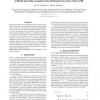Free Online Productivity Tools
i2Speak
i2Symbol
i2OCR
iTex2Img
iWeb2Print
iWeb2Shot
i2Type
iPdf2Split
iPdf2Merge
i2Bopomofo
i2Arabic
i2Style
i2Image
i2PDF
iLatex2Rtf
Sci2ools
120
click to vote
INTERSPEECH
2010
2010
Artificial and online acquired noise dictionaries for noise robust ASR
Recent research has shown that speech can be sparsely represented using a dictionary of speech segments spanning multiple frames, exemplars, and that such a sparse representation can be recovered using Compressed Sensing techniques. In previous work we proposed a novel method for noise robust automatic speech recognition in which we modelled noisy speech as a sparse linear combination of speech and noise exemplars extracted from the training data. The weights of the speech exemplars were then used to provide noise robust HMM-state likelihoods. In this work we propose to acquire additional noise exemplars during decoding and the use of a noise dictionary which is artificially constructed. Experiments on AURORA-2 show that the artificial noise dictionary works better for noises not seen during training and that acquiring additional exemplars can improve recognition accuracy.
| Added | 19 May 2011 |
| Updated | 19 May 2011 |
| Type | Journal |
| Year | 2010 |
| Where | INTERSPEECH |
| Authors | Jort F. Gemmeke, Tuomas Virtanen |
Comments (0)

